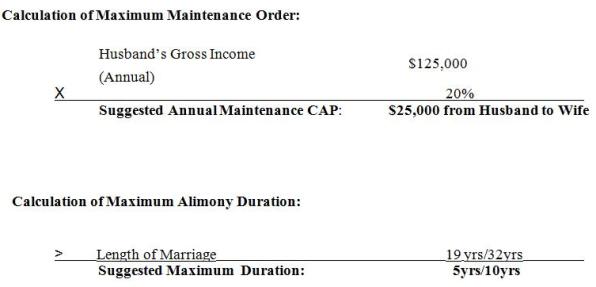Business Formations for New Entrepreneurs in TX
What are the most common Business Structures for your new Texas business venture?
Always planning for common or unpredictable major life events in your business dealings makes very good financial and legal sense. Getting good legal advice up front when setting up your new Texas business will save much time, money and stress in your future business decisions.
Watch our video and read more on our blog about business formations in Texas here.
Julian Nacol, attorney
Nacol Law Firm P.C.
Dallas TX
(972) 690-3333
Texas Divorce Spousal Maintenance Calculator
Texas is one of the most restrictive states when it comes to ordering spousal support; or “maintenance” as it is defined in the Texas statute. Texas House Bill 901 changing the spousal maintenance law in the Texas Family Code became effective for divorce cases on September 1, 2011. The bill revised the conditions that establish eligibility for spousal maintenance, commonly referred to as alimony and changed the factors required to be considered by a court in determining the nature, amount, duration, and manner of periodic payments for a spouse who is eligible to receive maintenance.
The court that determines a spouse is eligible to receive maintenance shall determine the nature, amount, duration, and manner of periodic payments by considering all relevant factors, including:
(1) each spouse’s ability to provide for that spouse’s minimum reasonable needs independently, considering that spouse’s financial resources on dissolution of the marriage;
(2) the education and employment skills of the spouses, the time necessary to acquire sufficient education or training to enable the spouse seeking maintenance to earn sufficient income, and the availability and feasibility of that education or training;
(3) the duration of the marriage;
(4) the age, employment history, earning ability, and physical and emotional condition of the spouse seeking maintenance;
(5) the effect on each spouse’s ability to provide for that spouse’s minimum reasonable needs while providing periodic child support payments or maintenance, if applicable;
(6) acts by either spouse resulting in excessive or abnormal expenditures or destruction, concealment, or fraudulent disposition of community property, joint tenancy, or other property held in common;
(7) the contribution by one spouse to the education, training, or increased earning power of the other spouse;
(8) the property brought to the marriage by either spouse;
(9) the contribution of a spouse as homemaker;
(10) Marital misconduct, including adultery and cruel treatment, by either spouse during the marriage; and
(11) Any history or pattern of family violence, as defined by Section 71.004 of the Texas Family Code.
The maximum amount of spousal support that courts may award is the lesser of $5,000.00 per month or 20 percent of the payer’s average gross monthly income. This is the maximum amount of maintenance the court orders.
However, in all circumstances, the law provides that the Court shall order maintenance for the shortest reasonable period that allows the recipient to earn sufficient income to meet his or her “minimum reasonable needs” and as follows:
The Texas law mandates the maximum duration of support as follows:
Maintenance shall be paid for a maximum of:
• 5 years, if due to family violence conviction and marriage is under 10 years;
• 5 years, if marriage is between 10 and 20 years;
• 7 years, if marriage is between 20 and 30 years;
• 10 years, if marriage is 30 years or more;
except in the case of an incapacitating physical or mental disability, in which case the award may last as long as the disability.
In addition, the law allows the Texas Family Law Courts to terminate maintenance if the recipient “cohabits with another person in a permanent place of abode on a continuing, conjugal basis.”
Sample Calculation of Texas Spousal Support Maintenance:
Children in Distress: What to Do When You Need Emergency Relief
The right to obtain physical possession of a child, the right to obtain temporary relief without prior notice to the other party, and the right to exclude a party from a residence are all special circumstances in which emergency relief may be requested.
A writ of attachment is a court order requiring a child be produced at a particular location at a particular time. It is used in situations where a party is entitled to possession of a child under a court order. It may also be used when an emergency exists and a child is in imminent danger to his or her physical or emotional welfare.
The remedy is extraordinary. As such, specific facts must be alleged to command the court to issue the writ. The writ should be requested only when necessary to protect the welfare of the child.
Section 105.001 of the Texas Family Code provides the court may not render an order, except on a verified pleading or an affidavit which (1) attached the body of a child; (2) takes the child into the possession of the court or into the possession of a person designated by the court or (3) excludes a parent from possession of or access to a child.
Requests for writs of attachment are contained in petitions, motions and applications in suits affecting the parent child relationship and are filed ancillary to other requests. The court must then make a determination as to whether the necessity exists for the writ and the applications are in proper order.
The court issues a writ commanding any sheriff or constable to attach the body of a child and deliver the child to a designated place. That designated place is a location specified by the court who may command that the child be brought to the court or the court may provide a location where the child may be delivered by law enforcement.
Habeas corpus actions are brought when a party claiming a right to possession of a child is seeking the court’s help in getting the child physically turned over to that party. The court shall compel return of the child to the person filing the habeas corpus only if the court finds that the filer is entitled to possession under the order.
If the court fails to compel return of the child, the court may issue temporary orders if a suit affecting the parent child relationship is pending. The court may issues such temporary orders only if the suit affecting parent child relationship is pending and the temporary hearing is set at the same time as the habeas corpus hearing. The court may then enter an order if a serious immediate question concerning the welfare of the child is shown at the temporary hearing.
The court has defined “serious and immediate question” to mean imminent danger of physical or emotional harm that requires immediate action to protect the child. If a right to possession is established, the exception to granting the writ occurs when a serious and immediate question concerning the welfare of the child exists. If the writ is denied after the right to possession under a prior court order is established, the Texas Supreme Court requires the trial court issue a written temporary order containing a finding that there is a serious and immediate question concerning the child.
A serious and immediate question, although often alleged, is rarely found in habeas corpus actions.
A temporary order, when entered, should not be a final adjudication of custody. At a minimum, the temporary order should contain the filer’s temporary rights to possession and should set a further hearing.
Need help with an emergency relief order ?
Call us, we can help!
Nacol Law Firm
(972) 690-3333
Dallas Child Custody Attorneys
My Marriage is in Trouble! There is an Addict in the House!
Addiction is one of the most damaging and challenging problems spouses will ever face in a marriage. Because additive behavior touches everyone in a family, most marriages are severely damaged years before a decision is reached to end the marriage.
Most non-addictive members of a family feel helpless because they cannot stop the addict’s downhill spiral that destroys the family eventually resulting in divorce. Addiction hurts the addict, the spouse, children and extended family members.
Some Statistics on Addiction in the US
– The United States accounts for only 5% of the world’s population. However, two-thirds of illegal drugs are consumed in America.
– Approximately 14 million Americans, 7.4% of the population, meet the diagnostic criteria for alcohol abuse or alcoholism.
– Children of addicts or alcoholics are almost 3 times as likely to be verbally, physically. or sexually abused; and 4 times more likely than other children to be neglected.
– 1 in 4 deaths in the U .S. can be attributed to alcohol, tobacco, or illicit drug use.
– More than 75% of domestic violence victims report that their assailant had been drinking or using illicit drugs at the time of the incident.
– 8 million Americans have eating disorders
– 2 million U.S. citizens are estimated to be pathologically, problematic gamblers
– 1 to 2 million cocaine addicts in the US
– At least 12 million American spouses suffer from the effects from the effects of living with an addict.
All addictive illnesses are usually progressive and unless help is sought through attained rehabilitation, 12-step programs or other meaningful support, an addict will predictably continue to act in a self-destructive manner. The threat of divorce is usually not enough incentive for the addict to address their addiction.
Mental Illness and the Child Custody Case
According to the National Institute of Mental Health, an estimated 26.2 percent of Americans age 18 and older – about one in four adults – suffer from a diagnosable mental disorder in a given year. This figure translates to 57.7 million people. Many people suffer from more than one mental disorder at a given time. Nearly half (45 percent) of those with mental disorder meet criteria for two or more disorders, with severity strongly related to co-morbidity. Mental illnesses are biologically based brain disorders. A diagnosed mental illness in a custody case may not only affect the eventual outcome of the case, but may also determine how counsel prepares his or her particular case strategy.
There are degrees of severity and levels of functioning with all mental disorders, and in the context of a contested custody case an extreme position can be easier for an attorney to handle. The fact finder is evaluating each parent’s ability to meet the child’s needs and the parties’ particular parenting abilities. A psychiatric diagnosis is not in and of itself a measuring tool. The specific acts of each parent must be examined in detail.
One important factor to consider is a request for psychological testing or the appointment of a counselor or psychiatrist to evaluate the parties. If the party with the mental illness has not admitted they have an illness, the results of court-ordered evaluations may force the issue and may also provide additional evidence to support a modification of temporary orders.
Counsel may want to recommend to the court that the child attend therapy. You may suggest the use of the therapist, psychiatrist, or psychologist of the person with the mental disorder for recommendations to the court of the parent’s visitation with the child.
Counsel may also want to consider a temporary injunction in addition to the standard temporary injunction for the preservation of property and protection of the parties and the children. Some issues to consider are preventing the use of alcohol within 24 hours of possession of the children; preventing the mentally ill party from operating a motor vehicle while taking medications, and preventing the parties from making disparaging remarks regarding the other party.
It is important that counsel identify and define the particular drugs the mentally ill patient is taking. Counsel should request a HIPPA Release (specifically related to mental health disclosures) allowing access to medical and prescription drug records of the mentally ill party. Research should then be performed as to the effects of each drug on the mentally ill person.
It may be necessary to have an Amicus Attorney appointed to represent the interests of the children. The Amicus Attorney has a powerful role in the contested custody case and can assist in gaining information on the mentally ill party. All parties should cooperate fully with the Amicus Attorney for the best interest of the children. It is important to make yourself available to the Amicus Attorney and to be pro-active in setting up appointments. It is important that counsel instruct you as to what to say and what not to say to the Amicus Attorney. It is also critical that counsel respond to any discovery propounded by an Amicus Attorney timely.
Be sure to educate yourself about the particular mental disorder you are dealing with. Make sure your experts have experience in handling the particular mental disorder in questions. Counsel should use the testimony of experts to offer aid and/or educate the judge and/or jury so they have a clear understanding of the mental illness and its foreseeable consequences to the spouse and/or family members.
NACOL LAW FIRM P.C.
8144 Walnut Hill Lane
Suite 1190
Dallas, Texas 75231
972-690-3333
Office Hours
Monday – Thursday, 8am – 5pm
Friday, 8:30am – 5pm
OUR BLOGS
SEARCH
JOIN OUR NETWORK

Attorney Mark A. Nacol is board certified in Civil Trial Law by the Texas Board of Legal Specialization








